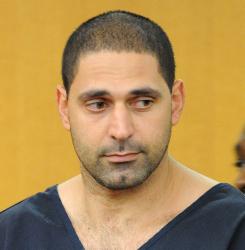Police believe Elias Abuelazam's stabbing spree started in late May when he killed a 31-year-old on a dark street in Flint, Mich., but Flint police did not begin discussing the possibility of a serial killer until late July, when the area had six stabbings over six straight nights.

Elias Abuelazam was caught Wednesday in Atlanta. (Erik S. Lesser, AP)
By the time they reached out to Michigan State Police to create a task force to track the killer in the first week of August, 14 people had been attacked, five fatally. He later became a suspect in attacks in two other states.
Steven Egger, a University of Houston-Clear Lake criminology professor who has studied serial killers, said a lack of communication among police departments is a nationwide problem that routinely delays the realization that a serial offender is operating in an area.
"Police officers are not trained to network," Egger said. "If they identified the pattern earlier, maybe they could've saved some lives."
Others believe Michigan police put the pieces together as fast as can be expected given the complexities of the stabbing spree.
"People think it's such a snap because they watch Criminal Minds," said Katherine Ramsland, a forensic psychology professor at DeSales University in Pennsylvania who has written about serial killers. "It's such a disservice to law enforcement because you have all these arm-chair detectives thinking it's so obvious in retrospect."
Abuelazam, 33, is suspected of assaulting a total of 18 people in Michigan, Virginia and Ohio. He was arrested at Hartsfield-Jackson Atlanta International Airport on Wednesday just before boarding a plane for Israel, where he was born. He is being held in an Atlanta jail awaiting extradition to Michigan.
The first two attacks were nearly a month apart.
"For those first two, we had absolutely no statement, no suspect, no evidence, no witness," Genesee County Prosecutor David Leyton said last week. "We had nothing."
Mark Safarik, a retired FBI profiler, said police would have performed a regular investigation into the first killing and after the second, they would have tried to link the victims.
"It isn't until you start getting into your third, fourth cases before you start to figure out, 'We've got a serial offender here,' " Safarik said.
Michigan State Police Lt. Stephen Sipes said identifying the pattern proved even more difficult because the attacks happened in different jurisdictions.
When Michigan investigators got together in late July and decided to call for a task force in August, that was right when police say Abuelazam moved on to Virginia, where he is suspected of attacking three people.
While in Virginia, he was stopped by police after a routine traffic stop, but they didn't know whom they had.
After the Virginia attacks, Leesburg police detectives searched for similar crimes, found reports of the Flint stabber and contacted Michigan police, Leesburg officer Chris Jones said.
Abuelazam was captured after police received a tip.
Ramsland said the task force clearly worked well once they had a name.
"I remember seeing some of the headlines and then, boom, the guy is caught," Ramsland said. "I really think it was a fast arrest. And in the nick of time."











